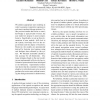Free Online Productivity Tools
i2Speak
i2Symbol
i2OCR
iTex2Img
iWeb2Print
iWeb2Shot
i2Type
iPdf2Split
iPdf2Merge
i2Bopomofo
i2Arabic
i2Style
i2Image
i2PDF
iLatex2Rtf
Sci2ools
ACL
2003
2003
Flexible Guidance Generation Using User Model in Spoken Dialogue Systems
We address appropriate user modeling in order to generate cooperative responses to each user in spoken dialogue systems. Unlike previous studies that focus on user’s knowledge or typical kinds of users, the user model we propose is more comprehensive. Specifically, we set up three dimensions of user models: skill level to the system, knowledge level on the target domain and the degree of hastiness. Moreover, the models are automatically derived by decision tree learning using real dialogue data collected by the system. We obtained reasonable classification accuracy for all dimensions. Dialogue strategies based on the user modeling are implemented in Kyoto city bus information system that has been developed at our laboratory. Experimental evaluation shows that the cooperative responses adaptive to individual users serve as good guidance for novice users without increasing the dialogue duration for skilled users.
ACL 2003 | ACL 2007 | Dialogue | User | User Modeling |
Related Content
| Added | 31 Oct 2010 |
| Updated | 31 Oct 2010 |
| Type | Conference |
| Year | 2003 |
| Where | ACL |
| Authors | Kazunori Komatani, Shinichi Ueno, Tatsuya Kawahara, Hiroshi G. Okuno |
Comments (0)

